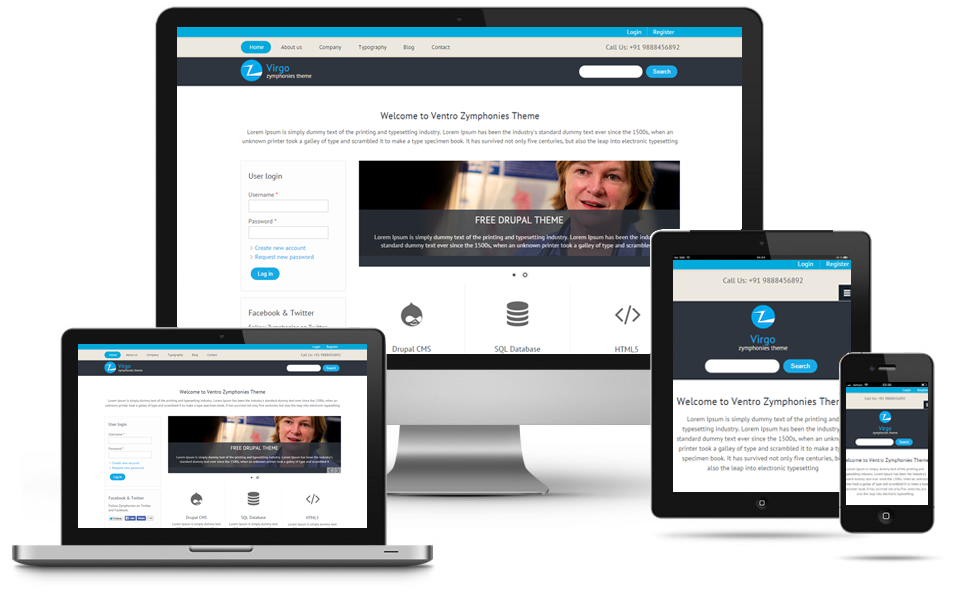

- Drupal cms features upgrade#
- Drupal cms features code#
- Drupal cms features license#
- Drupal cms features free#
Drupal also allows for automatic detection of preferred language, thus helping you offer a premium user experience. If your business is international, then having multilingual capabilities without compromised user experience is vital.ĭrupal allows for automated language translation and international SEO. With the Drupal CMS platform, you get some of the most important security features such as user access control, DB encryption, protection against DoS attacks and malicious data entry, security patches, security reports, etc. This is probably why many governments, banking, public administration, and healthcare companies use Drupal as their CMS.

Securityĭrupal CMS comes with advanced security features and claims to be “resilient against critical internet vulnerabilities.” In fact, their dedicated security team takes care of identifying and mitigating any cybersecurity risks. This can help you save a significant amount of time and money. If you’re expanding your business with the need to manage a large amount of content while focusing on scalability, marketing automation is a must.ĭrupal helps you create powerful marketing automation workflows and manage data in bulk. Drupal also allows you to improve website performance by offering lower page speed load times. So, choosing a CMS that allows you to handle such spikes is crucial.ĭrupal’s performance features help your business website perform well under such unforeseen, high-load situations. It is common for enterprises to see sudden spikes in website traffic. You can also conduct A/B and multivariate testing. You can use this to segment and target users with personalized messaging, leading to better conversions and ROI. Personalizationĭrupal allows you to create unique personalized profiles for every site visitor based on data such as clicks, decisions, geolocation, browser history, etc. Content personalization and retargeting are other additional features you’d love. Multiple authors can work on content simultaneously and deploy it easily across various channels.ĭrupal also allows for integrations with important marketing tools, making it a one-stop solution for creating enterprise-wide content campaigns under the same brand. Using Drupal CMS, you can manage and publish multimedia content across multiple channels. Drupal CMS features | Content Authoring Now let’s have a closer look at each CMS and its key aspects for comparison-market share, website examples, key features, pros and cons, and integrations. Having this knowledge may already help you eliminate the ones that may not suit your business needs.
Drupal cms features license#
In the case of closed source CMS, you have to pay a hefty license cost to gain access to the CMS features apart from extra expenses.Īs mentioned in the above table, WordPress and Drupal are popular open-source CMS platforms, while Sitecore is a closed-source one. You may only have to pay for hosting, additional plugins, or developers. Open-source CMS is usually available for free. You can expect premium customer support when you opt for a closed CMS platform. Instead, you have to rely on forums or hire CMS experts to fix these bugs. You cannot expect any prompt customer support in case of issues and bugs with open source CMS code. Hence, you can expect a very high level of security with a closed source CMS platform.
Drupal cms features code#
Restrictions on the availability of code make it difficult for hackers to plan attacks. Security issues may arise in the case of open-source CMS because the code is open for hackers to practice. There is no community support in closed-source CMS, and you’d have to rely on the support team to resolve any issues.
Drupal cms features upgrade#
Developers can upgrade the current CMS code and fix any bugs. Since the code is available for the public, you can expect community support.

Businesses can pay a licensing cost to use the CMS features, but they cannot modify the code. The code of a closed-source CMS is accessible only to the original authors.
Drupal cms features free#
Developers are free to update, improve, and expand the source code to suit their needs. The open-source CMS code is available to everyone for free. Closed-Sourceīefore we begin comparing the CMS, it’s important to understand the difference between open-source and closed-source CMS. Many aspects are subjective and the “best” choice is based on your business’ requirements and goals.īy the end of this article, you’ll be able to make an informed decision about the best CMS option to go with that will help you hit your short-term and long-term goals. Here, we’ll break down every aspect of the CMS for you to pick the best one based on the specific needs of your business.Ĭhoosing a CMS is not an easy affair as there is no “best CMS ” out there. In this extensive guide, we compare the top three most popular CMS choices for enterprises-Drupal, Sitecore, and WordPress. Growth of WordPress, Drupal, and Sitecore from 2016 to present |


 0 kommentar(er)
0 kommentar(er)
